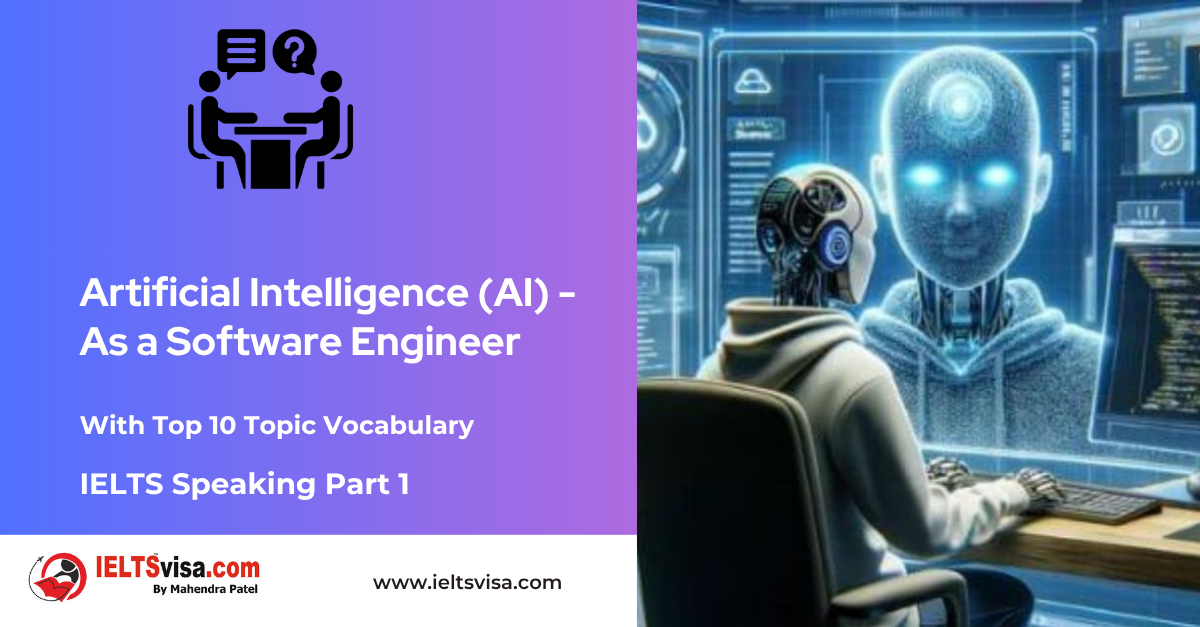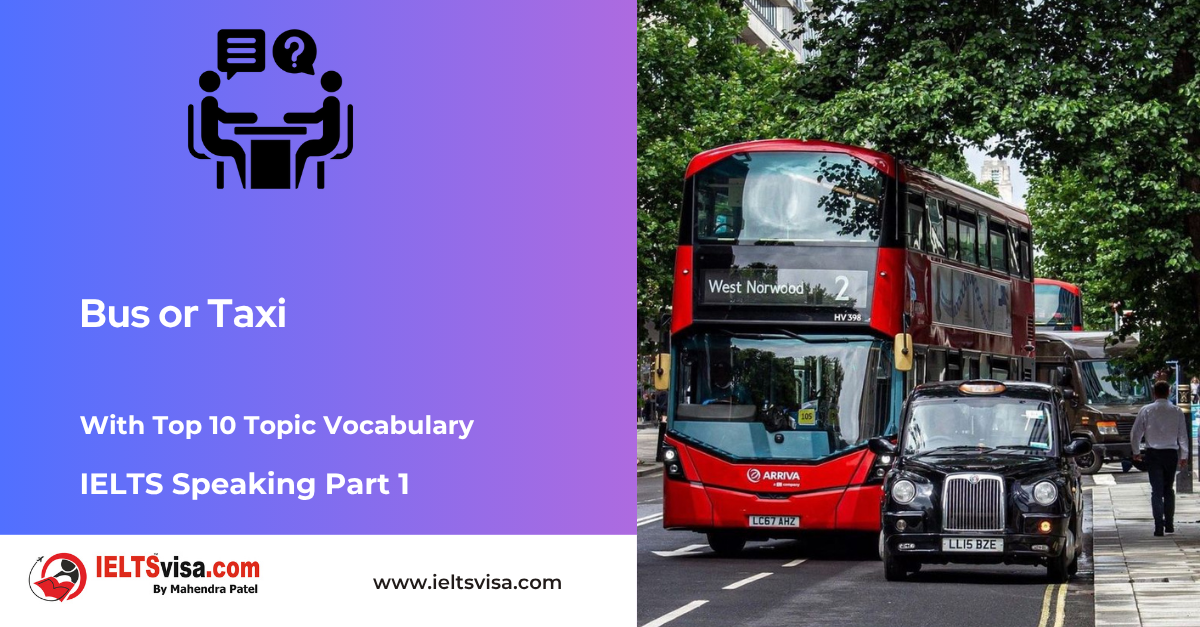IELTS Speaking Part 1 – Artificial Intelligence (AI) As a Software Engineer
IELTS Speaking Practice
IELTS Speaking Part 1 – Artificial
Intelligence (AI) As a Software Engineer
Topic: Artificial Intelligence (AI)
Examiner: Do you use artificial intelligence in your work as a software engineer?
Candidate: Yes, I frequently use AI in my work. It helps in developing smart applications that can learn from data, recognize patterns, and make decisions with minimal human intervention.
Examiner: Can you give an example of how AI is integrated into your projects?
Candidate: One example is using machine learning algorithms to analyze user behaviour on a platform and provide personalized recommendations, improving user experience and engagement.
Examiner: What programming languages do you use for AI development?
Candidate:I mainly use Python for AI development because of its extensive libraries like TensorFlow, Keras, and Scikit-learn. R and Java are also used, depending on the project requirements.
Examiner: What are some challenges you face when working with AI?
Candidate: Some challenges include handling large datasets, ensuring data quality, managing computational resources, and addressing ethical considerations like bias and privacy concerns in AI models.
Examiner: How do you stay updated with the latest advancements in AI?
Candidate:: I stay updated by reading research papers, attending conferences, participating in online courses, and being active in professional networks and AI communities.
Examiner: Do you think AI can replace human software engineers in the future?
Candidate: AI can automate many coding tasks, but I believe human software engineers will still be essential for designing complex systems, making strategic decisions, and ensuring ethical use of technology.
Examiner: What impact do you think AI will have on software development?
Candidate: AI will significantly streamline software development processes by automating testing, debugging, and code generation, leading to more efficient and higher-quality software production.
Examiner: Are there any ethical concerns related to AI in your field?
Candidate: There are ethical concerns, such as ensuring fairness in AI algorithms, preventing misuse of AI technologies, and protecting user data privacy. Addressing these concerns is crucial in our work.
Examiner: How do you ensure the AI models you develop are unbiased?
Candidate: We ensure AI models are unbiased by using diverse datasets, implementing fairness checks, regularly auditing model performance, and incorporating feedback from different stakeholders.
Examiner: What role does AI play in cybersecurity?
Candidate: AI plays a crucial role in cybersecurity by detecting anomalies, predicting potential threats, automating incident responses, and continuously monitoring systems to prevent cyber-attacks.
Examiner: How important is collaboration in AI projects?
Candidate: Collaboration is vital in AI projects. It involves working with data scientists, domain experts, and other stakeholders to ensure the AI solutions are accurate, relevant, and address real-world problems effectively.
Examiner: Can you describe a recent AI project you worked on?
Candidate: Recently, I worked on an AI-powered chatbot for customer service. The chatbot uses natural language processing to understand customer queries and provide accurate and helpful real-time responses.
Examiner: How do you test and validate AI models?
Candidate: We test and validate AI models through cross-validation, using separate training and testing datasets, and performing performance evaluations using metrics like accuracy, precision, recall, and F1 score.
Examiner: What do you think is the future of AI in software engineering?
Candidate: The future of AI in software engineering includes more advanced automated coding tools, enhanced predictive analytics, and AI-driven development environments that further reduce the time and effort required to build and maintain software.
Examiner: How do you balance the use of AI with traditional software engineering methods?
Candidate: We balance AI and traditional methods by integrating AI, which adds value, such as in automation and data analysis while relying on traditional methods for tasks that require human intuition, creativity, and strategic planning. This hybrid approach ensures the best of both worlds.
Top 10 Topic Vocabulary for “Artificial
Intelligence (AI) As a Software Engineer”
|
Vocabulary |
Type |
Meaning |
Synonyms |
Antonyms |
Word Family |
Example Sentences |
|
Personalized |
Adjective |
Tailored to a specific individual or group |
customized, individualized, bespoke |
standardized, generic, common |
personalization |
The AI system provided personalized recommendations to the user. |
|
Engagement |
Noun |
The act of taking part in something |
involvement, participation, commitment |
disengagement, detachment, indifference |
engage |
The AI-powered platform increased user engagement. |
|
Extensive |
Adjective |
Covering or including a wide area or range |
broad, comprehensive, vast |
limited, narrow, restricted |
extensively |
Python has extensive libraries for AI development. |
|
Computational resources |
Noun |
The computing power available for a particular task |
computing power, processing power, computational capacity |
computational |
The AI project required significant computational resources. |
|
|
Ethical considerations |
Noun |
Moral or philosophical issues that need to be considered |
moral dilemmas, ethical questions, ethical concerns |
ethical |
The software engineer considered the ethical implications of the AI model. |
|
|
Bias |
Noun |
Prejudice in favour of or against something |
prejudice, partiality, slant |
impartiality, objectivity, neutrality |
biased |
The AI model was trained on biased data, leading to biased results. |
|
Fairness |
Noun |
The quality of being impartial and just |
impartiality, objectivity, neutrality |
unfairness, injustice, inequity |
fair |
The software engineer ensured fairness in the AI algorithm. |
|
Anomalies |
Noun |
Deviations from what is typical or expected |
irregularities, abnormalities, oddities |
normalities, regularities, standards |
anomalous |
The AI system detected anomalies in the network traffic. |
|
Incident responses |
Noun |
Actions taken to address a security breach or other adverse event |
security responses, crisis management, emergency response |
incident |
AI can help automate incident responses to cyber-attacks. |
|
|
Stakeholders |
Noun |
A person with an interest in a company, project, or enterprise |
interested parties, participants, actors |
stakeholder |
The software engineer collaborated with various stakeholders to develop the AI solution. |

Our Books
Master IELTS Speaking Part 1
IELTS Writing Task 1 Book
IELTS Writing Task 2 Book
Practice IELTS Other Modules
IELTS Listening
The IELTS Listening test assesses how well you can understand spoken English in various contexts. It lasts about 30 minutes and is divided into four sections with a total of 40 questions. The listening tasks become increasingly difficult as the test progresses.
IELTS Academic Reading
The IELTS Academic Reading section assesses your ability to understand and interpret a variety of texts in academic settings. It is designed to evaluate a range of reading skills, including skimming for gist, reading for main ideas, reading for detail, understanding inferences, and recognizing a writer's opinions and arguments.
IELTS Speaking
The IELTS Speaking test assesses your ability to communicate in English on everyday topics. It lasts 11-14 minutes and consists of three parts: introduction, cue card, and a discussion based on the cue card topic.
IELTS General Reading
IELTS General Reading tests your ability to understand and interpret various types of texts. Here are some key areas and types of content you can expect to encounter in the reading section, along with tips for effective preparation.
IELTS Academic Writing Task 1
In IELTS Academic Writing Task 1, you are presented with a visual representation of information, such as graphs, charts, tables, or diagrams, and you are required to summarize, compare, or explain the data in your own words.
IELTS General Writing Task 1
In IELTS General Writing Task 1, you are required to write a letter based on a given situation. The letter can be formal, semi-formal, or informal, depending on the prompt. Here’s a breakdown of the key components to include in your letter
IELTS Academic Writing Task 2
In IELTS Academic Writing Task 2, you are required to write an essay in response to a question or topic. Here’s a guide to help you understand the essential elements of this task
IELTS Exam Tips
To succeed in the IELTS exam, practice regularly, familiarize yourself with the test format, improve your vocabulary, develop time management skills, and take mock tests to build confidence.
Grammer for IELTS
Grammar is the foundation of effective communication in English. Understanding tense usage, subject-verb agreement, and sentence structure enhances clarity and coherence in writing and speaking.
Vocabulary for IELTS
Vocabulary plays a crucial role in the IELTS (International English Language Testing System) exam, especially in the Speaking and Writing sections. Here’s an overview of why vocabulary is important and how it impacts your performance
RECENT IELTS SAMPLES QUESTIONS AND ANSWERS
IELTS Speaking Part 1 – Boats
IELTS Speaking Part 1 - Boats Examiner: Have you ever been on a boat?Candidate: Yes, I have been on a boat a...
IELTS Speaking Part 1 – Books
IELTS Speaking Part 1 - Books Examiner: Do you like reading books?Candidate: Yes, I enjoy reading books very...
IELTS Speaking Part 1 – Bus or Taxi
IELTS Speaking Part 1 - Bus or Taxi Examiner: How do you usually get around town?Candidate: My preferred mode...
IELTS Speaking Part 1 – Celebrity (Indian)
IELTS Speaking Part 1 - Celebrity (Indian) Examiner: Do you have a favourite celebrity?Candidate: My favourite...
IELTS Speaking Part 1 – Celebrity – Sports (Indian) – Virath Kohali
IELTS Speaking Part 1 - IELTS speaking part 1 - Celebrity - Sports (Indian) - Virath Kohali Examiner: Who is...
IELTS Speaking Part 1 – Artificial Intelligence (AI) as a Singer
IELTS Speaking Part 1 - Artificial Intelligence (AI) - As a Singer Examiner: How do you see AI impacting the...













